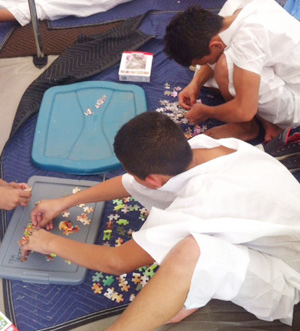By Ken Camp
In the past two weeks, Baptist disaster relief workers washed more than 1,200 loads of laundry and made available about 1,800 showers to unaccompanied Latin American children detained along the Mexican border after they entered the United States without documentation.
Texas Baptist Men volunteers planned to wrap up their ministry in Brownsville, Texas, May 31, when government contractors were scheduled to assume responsibility for providing showers, said Terry Henderson, TBM state disaster relief director.
 TBM worked in cooperation with the Border Patrol to provide showers and laundry service for the children, part of a sudden influx of unattended minors to the United States, primarily from El Salvador, Guatemala and Honduras.
TBM worked in cooperation with the Border Patrol to provide showers and laundry service for the children, part of a sudden influx of unattended minors to the United States, primarily from El Salvador, Guatemala and Honduras.
Authorities are detaining the undocumented children and teenagers temporarily at an emergency shelter in Brownsville until they can be transferred to a Department of Health and Human Services shelter. Officials then seek to locate relatives or other adult custodians in the United States to care for them while the courts settle their immigration cases.
About 400 children a day were entering the facility in Brownsville until May 28, when the numbers spiked to 600, Henderson reported.
“I don’t see any sign of it slowing down at all,” he said.
Harold and Kathy Patterson from First Baptist Church in Winnsboro, Texas, responded immediately in mid-May when Henderson called, asking them to bring their Northeast Texas Disaster Response mobile laundry unit to Brownsville.
It marked the 53rd time Patterson responded to a disaster relief call of some kind from TBM, but he observed the situation in Brownville resembled nothing he had seen before.
Detained children slept on blankets spread on concrete floors of holding cells. Border Patrol agents used their own money to buy shoes and socks for the children. Many young girls suffered sexual abuse during their journey to the United States.
“When we’d wash laundry, we’d find phone numbers written inside underwear with a marker or little pieces of paper pinned to clothes” as the only clues available to link children to prospective adult guardians in the United States, he said.
Many children arrived with head lice or scabies. In the course of two days, TBM volunteers treated 85 children for head lice, Henderson reported.
“The child care volunteers were going above and beyond, giving the children personal attention,” Kathy Patterson said. She recalled one day when volunteers gave a group of 6-year-old to 10-year-old girls a bottle of bubbles.
“They were blowing bubbles, just being kids again after the ordeal they had been through. One of the girls was from Honduras, and she said it took her nine months to get there.”
Some preschool children arrived with siblings or with groups of older children they met along the way. A few arrived with their mothers, who often were teenagers.
“I met one 3-year-old boy who traveled with a group of kids he didn’t even know. He was carrying an envelope with information about who to contact,” Henderson recalled.
Border Patrol agents — many working overtime to deal with the surge of immigrant children — welcomed the TBM disaster relief workers. The volunteers worked in an area enclosed by a 10-foot fence topped with concertina wire.
“But we had full access to all the parts of the building we needed,” Patterson said. “We immediately gained their trust.”
Volunteers had opportunities to talk one-to-one with the children, sharing their faith. Although authorities initially resisted the distribution of Bibles to the children, they relaxed those rules in the final days of TBM’s presence in Brownsville, Henderson said.
Many authorities attribute the surge in unaccompanied minor immigrants to gang violence in Central America, typically related to drug cartels. Three years ago, Border Patrol apprehended about 4,000 unaccompanied minors who entered the United States illegally. They already surpassed the projected 60,000 for this year, and authorities have revised their estimate to 120,000 in 2014.
“The crisis is not over,” Patterson said. “It’s going to continue. We learned some things about meeting the challenge.”
Donations for TBM disaster relief can be made by clicking here or sending a check designated “disaster relief” to Texas Baptist Men, 5351 Catron, Dallas, TX 75227.
